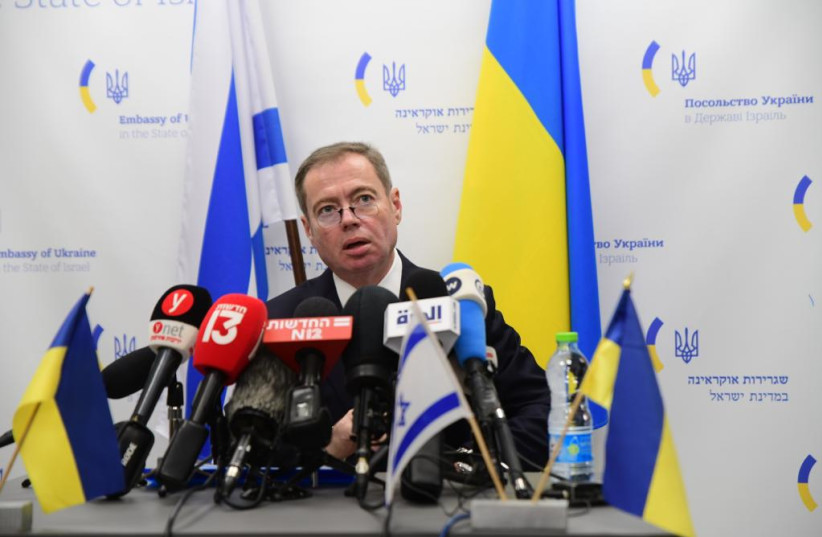Israel's role as a mediator doesn't justify its failure to fully support Ukraine, Ambassador Yevgen Korniychuk told reporters in Tel Aviv on Friday, as Russia's invasion of his country entered its third week.
"Saying we are mediators [so] that is why we have to be neutral to both parties – that is not the name of the game," he said.
Korniychuk downplayed the impact Israeli mediation has had so far, noting that there were many contenders for that role and that none of them had been successful.
He wryly commented that "if [former Israeli prime minister] Gold Meir or [former Zionist leader] Ze'ev Jabotinsky was in power," the story might be different.
"My understanding is that Israel does not have any exclusivity on the mediation" process, he said.

"I am not aware of any immediate tasks that have been taken by the Israeli government at the moment" to mediate, Korniychuk added.
Last Saturday, Prime Minister Naftali Bennett flew to Moscow to speak to Russian President Vladimir Putin and has subsequently spoken both with him and Ukrainian President Volodymyr Zelensky by phone. Bennett has also spoken with United Nations Secretary-General Antonio Guterres.
Israel has condemned the Russian invasion at the United Nations and Foreign Minister Yair Lapid has similarly spoken against Russia, but Bennett has been careful to speak only of his support for the Ukrainian people. As part of Israel's balancing act between Russia and Ukraine, it has not joined the global sanctions, nor has it sent military aid, although it has sent humanitarian assistance.
In a series of press events Korniychuk has held at the Ukrainian embassy since the start of the war, he has expressed his frustration with Israel, a country which he believed should have stood shoulder-to-shoulder with his.
On Friday he sat before a room crowded with cameras and called on Israel to fully sanction Russia, to accept more refugees and to send Ukraine military help and increased humanitarian assistance.
Ukraine expects Israel "to join the sanctions of the alliance including, but not only, those of the United States and the European Union," he said.
"We do believe that the current war is a war of values," the ambassador said, adding that the Israeli business community must take a value-based stand in support of Ukraine.
"We hope that morally the decision will be taken by every single big business in Israel to stop collaboration with Russia."
KORNIYCHUK ALSO called on Israel to send more "medical support and defense equipment." He was not placated, he said, by Israeli fears of antagonizing Russia given their military presence in Syria, which borders Israel in the north. Israel has sought, despite the conflict, to maintain its deconfliction agreement with Russia through which it coordinates its areal attacks against Iranian-backed targets.
The ambassador told the journalists that there are Russian planes and anti-missile systems in Syria and as a result Israel "is afraid."
At the same time, "let me point you to the Baltic states that directly neighbor Russia, which has thousands of troops on those borders.
Those Balkan states "do not care. They are sending military assistance to Ukraine. They are not afraid," he said.
Korniychuk also called on Israel to lift its cap of 25,000 on the number of Ukrainian refugees that can stay in the country. Some 20,000 were already in Israel prior to the war and over 3,000 have arrived since, so the quota is almost filled.
Israel is prepared for a massive influx of Ukrainian Jews, who are eligible for immediate immigration under the Law of Return. At issue are those Ukrainians who are ineligible for immigration but who have made it to Ben-Gurion airport seeking shelter in the Jewish state.
Korniychuk said he had met with Interior Minister Ayelet Shaked during the week to discuss increasing the quota. "I hope we will reach an amicable solution," he said, noting that most of the European countries had lifted their quotas on Ukrainian refugees in light of the war.
Israel is not an easy country to live in, so those who have arrived are ones who have friends or relatives here, Korniychuk said.
The ambassador noted that President Zelensky does feel a "special emotion for Israel because his mother is Jewish," but that that feeling has to be reciprocal.
On Korniychuk's list of issues was Israel's response to Zelensky's request to address the Knesset virtually from Ukraine. Knesset Speaker Mickey Levy (Yesh Atid) offered Zoom as a venue given that the Knesset is on a break and renovations are underway in the building.
Korniychuk said he thought Zoom was an inappropriate forum and that the event should be scheduled for the plenum, particularly given that Zelensky has addressed the US Congress, the European Parliament and the British parliament.
"I do not think it was a proper excuse that the Knesset was on holiday or offices are under renovation," he said.
When asked about the Palestinian Authority's position, he said that Ukraine had received "very little support from the Palestinians."
